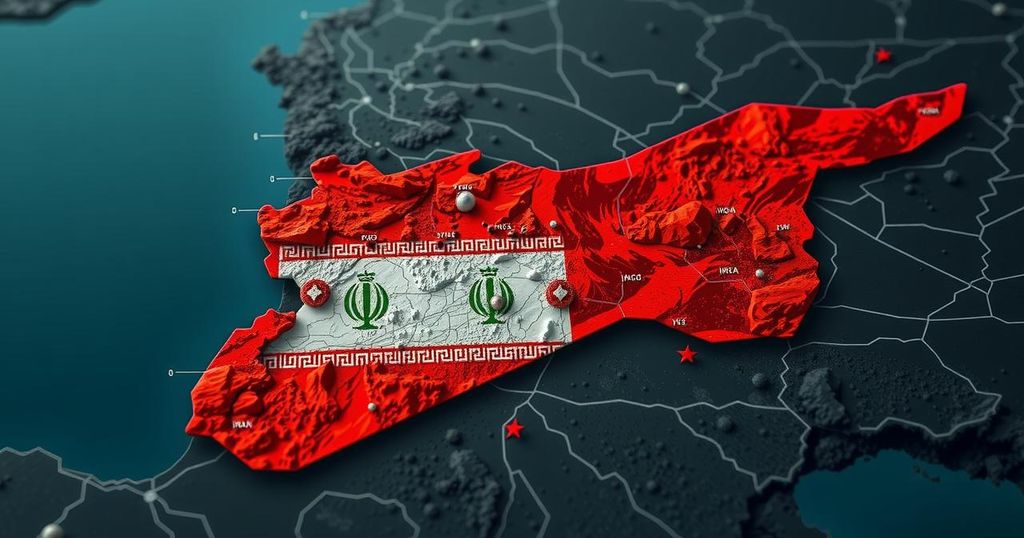This article discusses the strategic importance of Syria to Russia and Iran amid the ongoing conflict. Russia significantly relies on Syria for military access to the Mediterranean, while Iran benefits from its ability to support proxies like Hezbollah through Syria. The recent escalation in fighting highlights the vulnerabilities faced by both nations, which have historical ties to Syria. Maintaining this foothold is crucial for their geopolitical ambitions.
The Syrian conflict has significant implications for both Russia and Iran, as both countries have persistently supported President Bashar Assad’s regime. Recently, Russia has intensified its military involvement, conducting airstrikes against rebel forces, particularly in response to a recent offensive that has allowed opposition groups, notably Hayat Tahrir al-Sham, to seize control of Aleppo. The escalation presents dire consequences for both nations, as Syria serves as a strategic asset for Russian operations and a critical corridor for Iran’s influence in the region.
For Russia, Syria represents a vital link to the Mediterranean, providing access for its military bases at Hmeimim and Tartus. This presence enables Russia to extend its influence in the Middle East and Africa, counterbalancing U.S. power. According to Natasha Hall, a senior fellow at the Center for Strategic and International Studies, President Vladimir Putin cannot afford to see a pro-Russia regime fall in Syria, as it could jeopardize Russia’s military foothold in the region. Moreover, Russia’s naval operations in the Mediterranean have significantly expanded since establishing a strong base in Syria.
On the other hand, Iran views Syria as essential for maintaining its network of proxies across the Middle East, predominantly supporting Hezbollah in Lebanon. Steven Cook of the Council on Foreign Relations notes that Syria allows Iran to produce and transport weapons, as well as coordinate its operations with allied forces. With ongoing tensions with Israel affecting Hezbollah’s military capabilities, Syria has become even more critical for Iran’s regional strategy.
The historical ties between Russia and Syria date back to the Cold War, with military cooperation deepening under Putin and Assad’s leadership. Iran also forged close ties with Syria following the 1979 Iranian revolution. Notably, both countries have shifted some focus to other conflicts, particularly since Russia’s invasion of Ukraine, resulting in a longer-term impact on their engagement in Syria. Despite this distraction, the consequences of losing ground in Syria are severe for both nations and signify a deeper instability within their alliances.
In summary, the dynamics of the Syrian conflict underline Russia’s strategic interests in maintaining military access to the Mediterranean and countering U.S. influence, while Iran seeks to preserve its network of proxies and military influence in support of allies like Hezbollah. The recent developments signal that both Moscow and Tehran must recalibrate their strategies amid growing regional challenges, especially as opposition forces capitalize on their distracted focus.
The Syrian conflict, which began in 2011, has evolved into a battleground for various international powers, with Russia and Iran staunchly backing Syrian President Bashar Assad. As the conflict has escalated, these alliances have become increasingly significant due to geopolitical interests, military strategies, and regional influence. The fall of significant territories like Aleppo to opposition forces poses existential threats to the control these nations have sought to establish and maintain within Syria. Moreover, both countries have historical ties to Syria dating back decades, influencing their ongoing military involvements and strategic decisions in the region.
The Syrian conflict remains a focal point for Russia and Iran due to both nations’ strategic interests. Russia’s military presence is critical for maintaining its Mediterranean foothold, while Iran relies on Syria to sustain its proxy networks, particularly regarding Hezbollah. The shifting dynamics within the Syrian landscape serve as a reminder of the vulnerabilities faced by both countries. As they contend with growing challenges, the implications of losing influence in Syria would resonate across their regional policies and international standing.
Original Source: www.businessinsider.com







